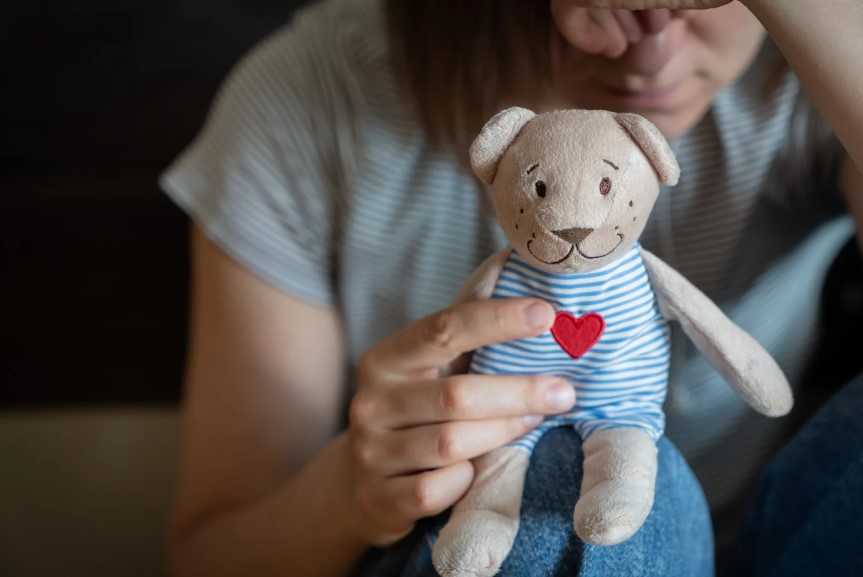Kirsten Fisch, MSN, RNC-MNN, IBCLC, LCCE Kirsten is a women's health nurse who specializes in high-risk pregnancy and postpartum care. She is certified in Maternal Newborn Nursing, a board-certified lactation consultant (IBCLC), and a Lamaze-certified childbirth Educator. She works with women from conception through postpartum. Passionate about empowering women during their reproductive journeys, Kirsten combines evidence-based care with compassionate support to promote health and well-being for mothers and babies.
The postpartum period is often portrayed as a time of joy and bonding with a new baby, but for those who experience the heartbreak of loss—whether through miscarriage, stillbirth, or neonatal death—it can be a profoundly isolating and painful time. Grieving while recovering from childbirth presents unique challenges, both physical and emotional. This blog post aims to provide guidance, compassion, and resources for navigating this difficult journey.

Honoring Your Experience
Your experience matters, and so does your grief. Every loss is unique, and there is no “right” way to process it. Allow yourself to feel a range of emotions—sorrow, anger, guilt, confusion, or even numbness. You are not alone, and your feelings are valid.
Consider creating rituals to honor your baby’s memory. This could be planting a tree, creating a keepsake box, writing a letter, or observing anniversaries in a way that feels meaningful to you. These acts can provide a sense of connection and a way to process your grief.
Seeking Support
Grief can feel isolating, but you do not have to navigate it alone. Reach out to trusted friends, family, or a partner for support. If your loved ones are unsure how to help, communicate your needs clearly—whether it’s a listening ear, practical help, or simply their presence.
Professional support can also be invaluable. Consider speaking with a therapist who specializes in perinatal loss or joining a support group. Organizations such as the Pregnancy and Infant Loss Support Center, Share Pregnancy & Infant Loss Support, and others offer resources and community for parents grieving a loss.
Caring for Your Body
Your body has gone through profound changes, and recovery still matters, even in the absence of a baby to hold. Postpartum bleeding, hormonal shifts, breast engorgement, and physical exhaustion are part of the process, and they can be compounded by the weight of grief.
- Physical Recovery: Follow up with your healthcare provider to ensure your physical recovery is on track. Don’t hesitate to discuss any concerns or symptoms, as your health is just as important now as it was during pregnancy.
- Breast Care: If you were lactating, you may need support to manage milk production. Techniques like gradual weaning, cold compresses, and certain medications can help. Lactation consultants can also provide guidance tailored to your situation.
- Rest and Nourishment: Grief can disrupt sleep and appetite, but prioritizing rest and balanced nutrition can aid both physical and emotional healing. Seek support from loved ones to help with meals or household tasks if needed.
Navigating Relationships
The strain of grief can affect relationships with a partner, family, or friends. Open communication is key. Share your feelings and listen to your partner’s if you’re in a relationship—you may grieve differently, and that’s okay. Educate close family and friends about how they can support you during this time.
If friends or acquaintances say unintentionally hurtful things, try to remember they likely mean well but may not know what to say. It’s okay to set boundaries or gently guide them on what is and isn’t helpful.
Finding Meaning and Healing
Healing doesn’t mean forgetting or moving on—it means finding ways to carry your baby’s memory while also rebuilding your life. For some, this might involve advocacy, raising awareness about pregnancy loss, or supporting others who are grieving. For others, it may be a more private journey of personal reflection and remembrance.
Journaling, art, or other creative outlets can help you process emotions and find meaning. Practices like mindfulness, yoga, or meditation may also offer comfort and grounding during this time.
Looking Ahead
The path forward will look different for everyone. Be patient with yourself and honor your pace of healing. Whether you decide to grow your family in the future or focus on other dreams, trust that your journey is valid.
Above all, remember that you are not alone. There is a community of people who understand the profound pain of postpartum loss and who are here to walk alongside you. Seeking help and finding ways to honor your grief are acts of courage and love—for yourself, your baby, and your future.
If you or someone you know is navigating postpartum after loss, know that help is available. Reach out, speak up, and take each day one step at a time. You are stronger than you realize, and healing is possible.

Kirsten Fisch, MSN, RNC-MNN, IBCLC, LCCE Kirsten is a women's health nurse who specializes in high-risk pregnancy and postpartum care. She is certified in Maternal Newborn Nursing, a board-certified lactation consultant (IBCLC), and a Lamaze-certified childbirth Educator. She works with women from conception through postpartum. Passionate about empowering women during their reproductive journeys, Kirsten combines evidence-based care with compassionate support to promote health and well-being for mothers and babies.



